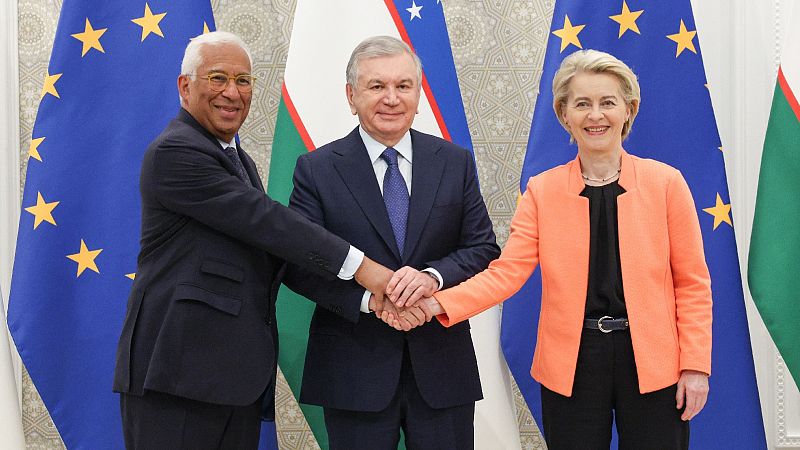EU-Uzbekistan enhanced partnership agreement could be signed as early as June

The EU and Uzbekistan will sign an enhanced partnership and cooperation agreement later this year, the European Council president has said.
"I hope to welcome you to Brussels later this year to sign our enhanced partnership and cooperation agreement as a fruitful result of our talks during these days," António Costa said at the opening of a trilateral meeting in Samarkand with European Commission President Ursula von der Leyen and Uzbekistan President Shavkat Mirziyoyev.
Euronews understands that the agreement's text has been concluded, and it must now be translated and undergo a legal review. However, it could be signed as early as June.
Sherzod Asadov, Mirziyoyev's press secretary, said in a statement that both sides have agreed to "promote joint programmes and cooperation projects in the fields of innovation, green energy, mining, agriculture, transport, logistics, digitalisation and other areas."
He also announced that as part of the talks, an agreement was reached to establish a regional office of the European Investment Bank (EIB) in Tashkent, the country's capital, which he described as an "important step towards transforming our country into an international financial hub."
The trilateral meeting was held a day before the Uzbek city hosts the first-ever EU-Central summit. Also attending are the leaders of Kazakhstan, Kyrgyzstan, Tajikistan and Turkmenistan, as well as the president of the European Bank for Reconstruction and Development, and an EIB delegation.
Costa said the talks and summit "will open a new chapter in our history, elevating the level of our common partnership."
Asadov, meanwhile, said that topics that should be explored will include strengthening economic cooperation, transport interconnections, sustainable development and ecology, and humanitarian cooperation.
"The most important outcome of the summit is expected to be the adoption of the Samarkand Declaration, which will give a strong impetus to the expansion of constructive dialogue between Central Asia and the European Union, intensifying cooperation in all areas, and elevate relations to the level of strategic partnership," he added.
A declaration of intent on critical raw materials is also expected to be signed, which EU senior officials, speaking on condition of anonymity, said earlier this week would be a win-win.
The EU would secure the rare earths it needs to power its energy transition and boost its strategic autonomy, as China currently controls significant shares of the mining and processing of many such materials. The region would also get the investments it needs to develop the local industry.
The packed agenda also includes the protection of multilateralism, joint and regional security challenges, tourism, people-to-people programmes as well as Ukraine.
EU senior officials said earlier this week that Costa and von der Leyen were expected to raise the issue of the circumvention of sanctions the EU imposed on Russia for the full-scale invasion of Ukraine.
Some Central Asian countries have benefited by selling European-made items to Russia that are banned from entering the country.
"This is, again, quite timely, given the new momentum in the Ukraine peace talks we've seen in Riyadh," one of the officials said.
Today

